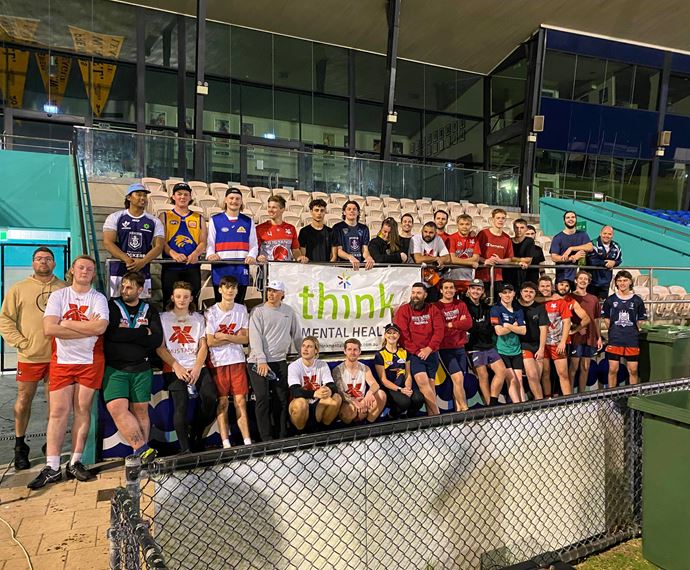Food secure and healthy children across regional and remote Western Australia
In this research, Chief Investigator Dr Stephanie Godrich measured fruit and vegetable consumption and the prevalence of food insecurity (irregular and unreliable access to food) among 9 – 13-year-old children living in regional and remote Western Australia (WA). Conducted as PhD research through Edith Cowan University in 2015 - 2016, the study also explored the relationship between fruit and vegetable consumption and food security determinants.
To increase healthy eating behaviours in young people by contributing to the literature examining fruit and vegetable consumption and food insecurity among children living in reginal and remote Western Australia.
Edith Cowan University
1/1/2015
Healthway
$75,614
State-wide
Children (12 years and under), Young people (aged 13-17), Families, General Community
- The study established an evidence base to inform policy and practice.
- Generated knowledge relating to food and vegetable consumption among children and the prevalence of food insecurity in regional and remote WA.
- Research findings were communicated widely, with information tailored for the different communication channels and audiences.
- Generated additional research and project funding.
- Consultation with stakeholders including health promotion officers, dietitians and First Nations organisations shaped communication resources used to disseminate project findings.
- Investing time and energy in networking, promoting the work and providing people with the opportunity to engage with the research.
- Navigating the required approvals and governance processes of schools while conducting research in regional areas potentially reduced the study’s sample size.
Opportunity
There is limited literature examining fruit and vegetable consumption and food insecurity among children living in regional and remote WA. This is despite the growing burden of disease relating to dietary risks, being above a healthy weight [1], and the critical role of healthy eating on young people's growth, development and lifelong health and wellbeing trajectory.
This research measured fruit and vegetable consumption of 9 - 13-year-old children living in regional and remote WA, and their adherence to the Australian Dietary Guidelines. It established the first reported prevalence of food insecurity among regional and remote WA children and generated insights into the factors that influence fruit and vegetable consumption, and how these factors interact with each other. The study extended the 2003 Conceptual Framework of the Determinants of Food Security to the Western Australian context [2], thereby furthering an evidence base to inform change in policy and practice.
The research focused on a priority population. People living in regional and remote areas have shorter lives, higher levels of disease, injury and poorer access to and use of health services, compared with people living in metropolitan areas [3]. The largest proportion of people living in ‘remote’ or ‘very remote’ areas are children aged 0-14 years.
Approach
While previous international and Australian studies focused on food security from one perspective (e.g. caregiver), Dr Godrich’s innovative and rigorous study included caregivers and children, food diaries and interviews to provide insight from the child, household and community perspective.
Schools were a key setting for the recruitment of participants. School Principals across regional and remote WA townships were invited to participate in the study, with individual class teachers, caregivers and children consenting to participate. Key to the study was that participants spanned WA geographic regions, degrees of remoteness, and socioeconomic status.
Data collection was undertaken across 69 classes in 23 schools. A total of 256 matched caregiver-child pairs were achieved.
340


Children aged 9-13 years surveyed on questions including demographics, usual serves of fruit and vegetables, items from the Child Food Security Survey Module [4, 5], and others.
347


Caregivers surveyed on questions including household demographics, their child’s usual serves of fruit and vegetables, items from the US Household Food Security Survey Module [6], and others.
20


Key informants including health, school, youth and food supply workers interviewed on aspects of the local food supply, barriers and enablers of fruit and vegetable consumption, suggestions for successful interventions to increase fruit and vegetable intake, and others.
Children and caregivers completed surveys based on internationally validated food security tools and the theoretical framework, Conceptual framework of the determinants of food security [2]. Dr Godrich designed a simple pictorial, tick-box survey which was used to account for different levels of literacy.
Additionally, in-depth, semi-structured interviews with people working in sectors such as health, food retail, or education sectors across regional and remote WA were conducted. These key informant interviews were undertaken in person or via telephone.
A number of statistical analyses and tests, and a thematic analysis were applied to understand the data.
Impacts and outcomes
"The research helped extend knowledge of food security and the underpinning drivers of the problem in rural and remote WA, as there was very limited evidence around those factors. It extended knowledge and helped people to think about what they could do to tackle the issue." Dr Stephanie Godrich
Conducted between 2015 - 2016, the study established an evidence base to inform policy and practice. It applied the Conceptual Framework of the Determinants of Food Security [2] to the WA context and generated knowledge relating to:
- Fruit and vegetable consumption among children in regional and remote WA, and adherence to the Australian Dietary Guidelines:
- 65.8% of children ate enough fruit
- 15.4% of children ate enough vegetables.
- Prevalence of food insecurity in regional and remote WA:
- Overall, 20.1% of children were food insecure.
- Food insecurity was more prevalent among children living in areas classified as medium level of socioeconomic disadvantage (compared to areas of high disadvantage) and in children of families that received government income support.
- Determinants of fruit and vegetable consumption among regional and remote WA children, including the different factors that exert influence at different levels (e.g. individual, household, school, community and public policy level).
- Determinants of food security among regional and remote WA children, including factors relating to food availability, food access and food utilisation.
- The association between food security determinants and adequate vegetable consumption among regional and remote WA children: location of food outlets, variety, promotion, and food price significantly predicted adequate vegetable consumption among children.
“We suspect that medium disadvantage households may be ‘slipping through the cracks’ or may not believe they need financial support or food supply. The higher prevalence of food insecurity among these children indicates more support for these families is required.”
Dr Stephanie Godrich
The research findings were communicated widely, with information tailored for the different communication channels and audiences.
- More than 50 presentations and keynote addresses were delivered locally, nationally and internationally. In addition, workshops were held with organisations such as Cancer Council WA, Foodbank WA, and the WA Country Health Service.
- The media campaign promoting the research was the second most successful campaign at Edith Cowan University in 2017.
- Six journal articles were published (see additional information for further details).
“I created these infographics to translate my journal articles into easily digestible one-pagers. I’m a practitioner first and foremost, I’m a nutritionist. And I thought, if that was me working in the field, how would research help me, and how would it help my work? And I wouldn’t have time to read journal articles, I didn’t when I was a practitioner, but I had time to quickly skim an infographic, or circulate it, or bring it to a workshop that I was running and refer to it. Or have time every now and then to listen to a presentation in the car, or something that was recorded. So I was really thinking about it from a practitioner’s point of view, what would be helpful.” Dr Stephanie Godrich
There were a range of additional impacts and outcomes of the Dr Godrich's research, including that it:
- Informed and influenced policy, as demonstrated by being cited in:
- The inquiry into the most effective ways for Western Australia to address food insecurity for children and young people affected by poverty (2022).
- The Public Health Association of Australia’s submission to the Federal Inquiry into food security and food pricing in remote Australia (2020).
- WA climate and health inquiry (2020).
- Documents used to inform the WA Obesity Advocacy targets (2019).
- Work used to support the rationale for a business case submitted to the Australian Government Department of Health. The business case sought to present the Department with innovative strategies for nutrition-focused service delivery to rural and remote communities in WA (2016).
- Built research capacity within WA:
- Provided a bridge between health promotion practice and research, through knowledge dissemination.
- Supported the career journey of the scholarship recipient, such as by broadening employment opportunities and informing future grants.
- Created international partnerships and cross-fertilisation of ideas/research, such as with Canadian and USA colleagues in international symposia and research trips.
- Informed early thinking around systems change and the researchers’ current systems change approach.
- Generated additional research and project funding:
- Edith Cowan University-funded pilot study, South West Food Community, in the South West of WA, 2018- 2022.
- Healthway funding to develop the Food Community website https://foodcommunity.com.au/home/.
- Healthway funding to undertake state-wide scale up of the South West Food Community pilot project, 2022.
“My PhD was the formative research that’s really helped build and lay the foundations for more grants, lots of media, and networks.”
Dr Stephanie Godrich
What we’d do differently
While imperative to the research, navigating the required approvals and governance processes of schools while conducting research in regional areas was challenging, and potentially reduced the study’s sample size (number of participants). Once approval was achieved, it was essential to factor in time and effort to build the relationships required with key school staff, including physically travelling to schools to deliver classroom ‘pitches’ and distribute information for students and parents.
What worked
Critical to the success of the research was consultation with stakeholders such as health promotion officers, dietitians and First Nations stakeholders in shaping the communication resources used to disseminate project findings. The co-design process of resource development ensured infographics and other resources were relevant, accessible and easily applied.
The importance of having a broad range of networking opportunities cannot be underestimated in research projects. To enhance knowledge dissemination, Dr Godrich invested significant time and energy in networking, actively promoting the work and providing people with the opportunity to hear about the research through a presentation or to see it visually displayed in an infographic.
Infographics
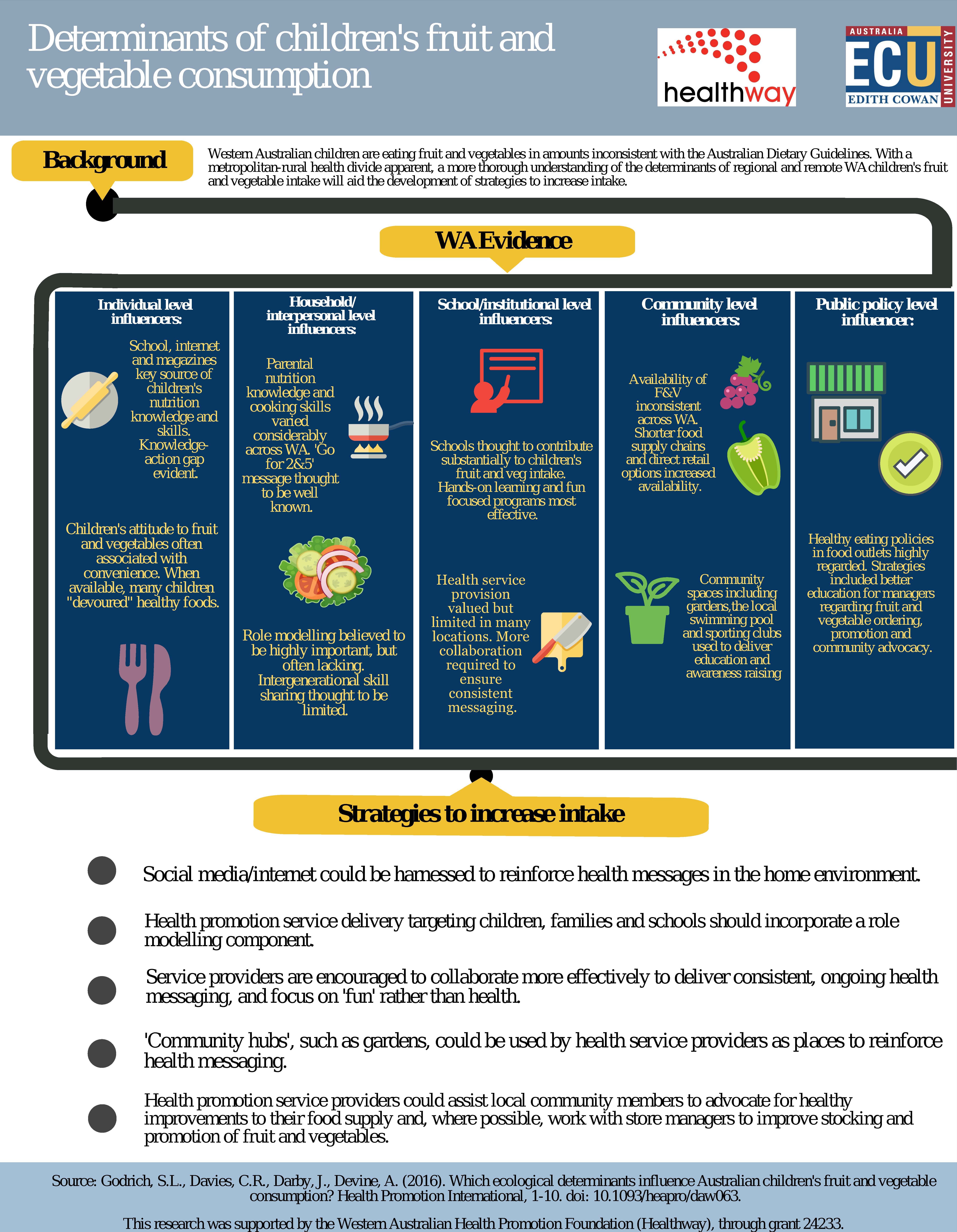
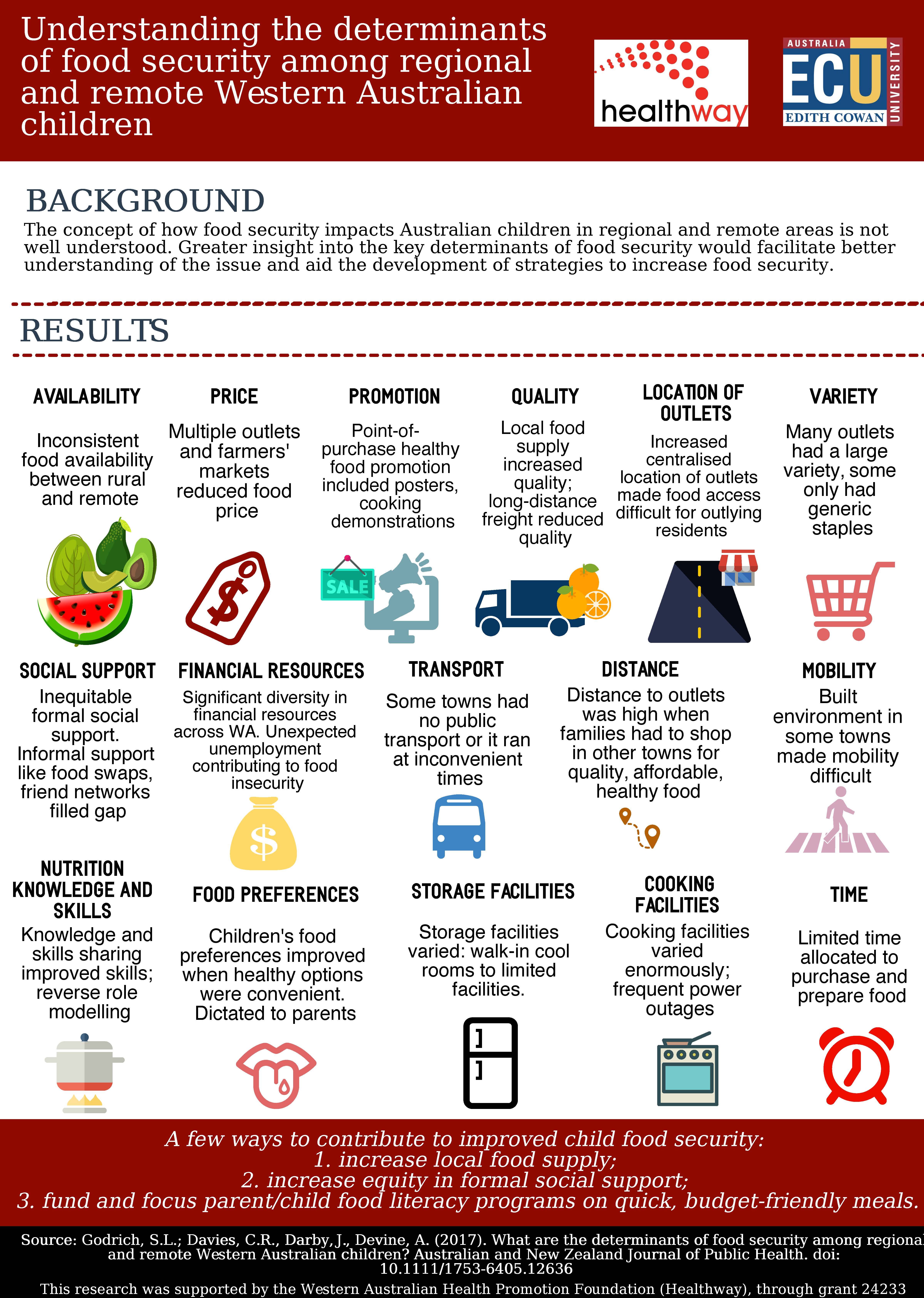
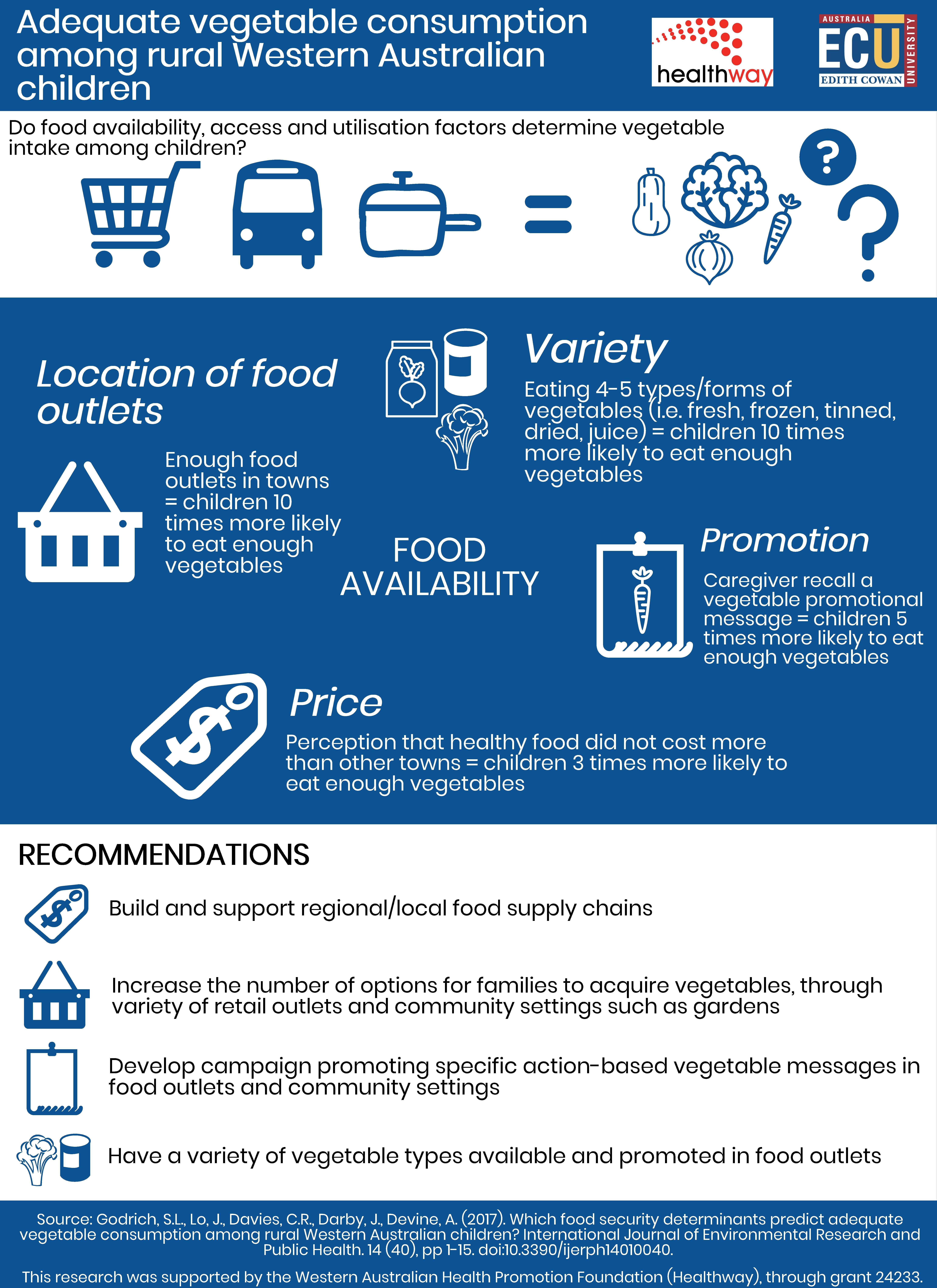
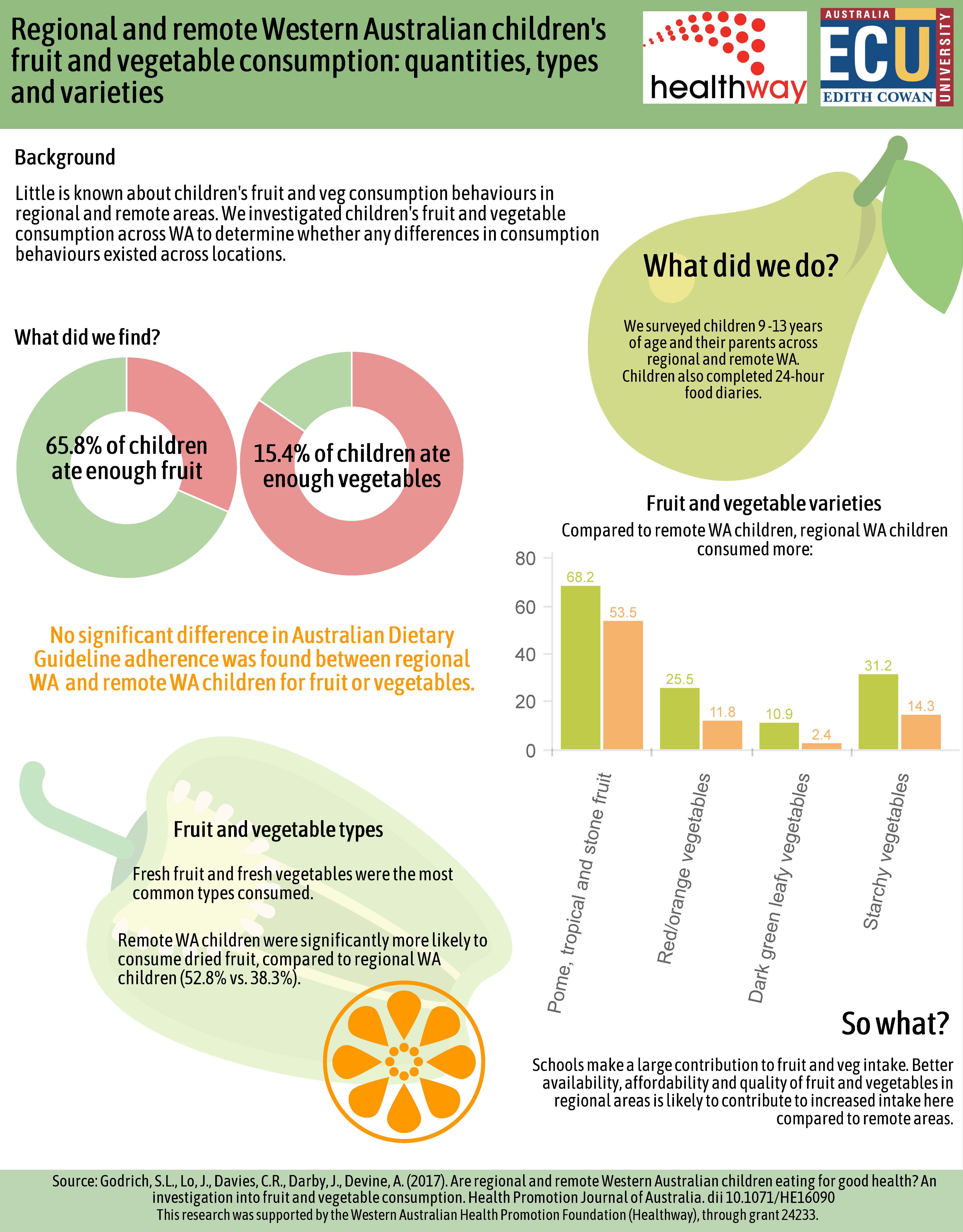
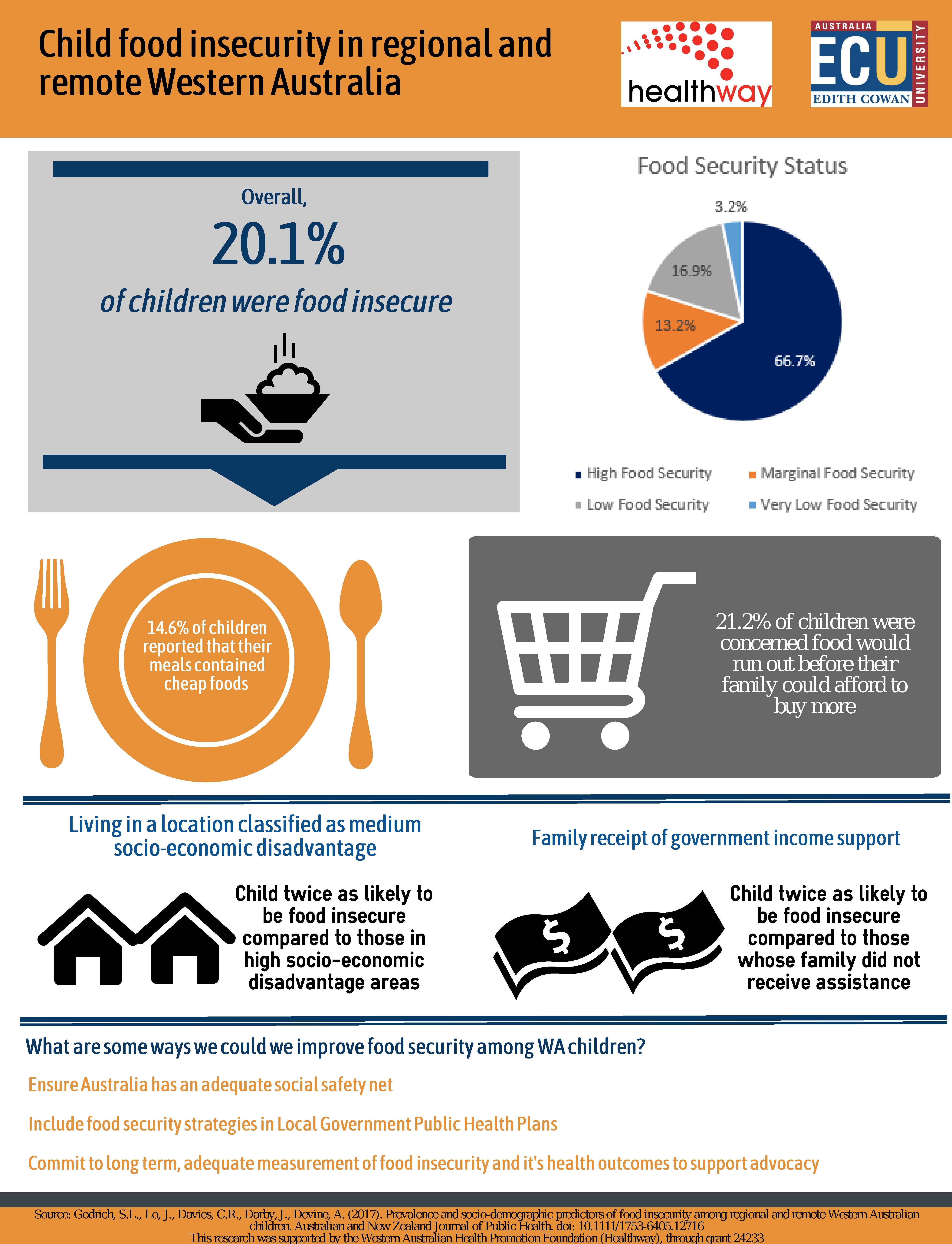
Additional links and resources
Want to learn more about this case study? Find related resources in this section.
Journal publications associated with this research
REFERENCES
- Australian Institute of Health and Welfare. Australian Burden of Disease Study: impact and causes of illness and death in Australia 2018. Australian Burden of Disease Study series no 23 Cat no BOD 29. Canberra: AIHW; 221.
- Rychetnik L, Webb K, Story L, Katz T. Food Security Options Paper: A planning framework and menu of options for policy and practice interventions. Improving Food and Nutrition in NSW Series: NSW Centre for Public Health Nutrition; 2003.
- Australian Institute of Health and Welfare. Rural and remote health: AIHW; 2022 [Available from: https://www.aihw.gov.au/reports/rural-remote-australians/rural-and-remote-health.
- USDA. Self-Administered Food Security Survey Module for Children Ages 12 Years and Older: U.S. Department of Agriculture; 2006 [Available from: https://www.ers.usda.gov/topics/food-nutrition-assistance/food-security-in-the-u-s/survey-tools/#youth.
- Connell CL, Nord M, Lofton KL, Yadrick K. Food security of older children can be assessed using a standardized survey instrument. The Journal of nutrition. 2004;134(10):2566-72.
- USDA. U.S. Household Food Security Survey Module: Six-Item Short Form: U.S. Department of Agriculture; 2013 [Available from: https://www.ers.usda.gov/topics/food-nutrition-assistance/food-security-in-the-u-s/survey-tools/#six.
- McKay FH, Haines BC, Dunn M. Measuring and Understanding Food Insecurity in Australia: A Systematic Review. International journal of environmental research and public health. 2019;16(3).
Learn about wellbeing
Understand how your community is going to help you to better target and plan your project.
Ready to plan your project?
Understand your vision, plan your impact and report on the outcomes of your project with three easy interactive tools in the Community Impact Planner.
Acknowledgement of Country
The Western Australian Community Impact Hub acknowledges and pays respect to the Traditional Owners of the land on which we are based, the Whadjuk people of the Noongar Nation and extends that respect to all the Traditional Owners and Elders of this country. We recognise the significant importance of their cultural heritage, values and beliefs and how these contribute to the positive health and wellbeing of the whole community.

